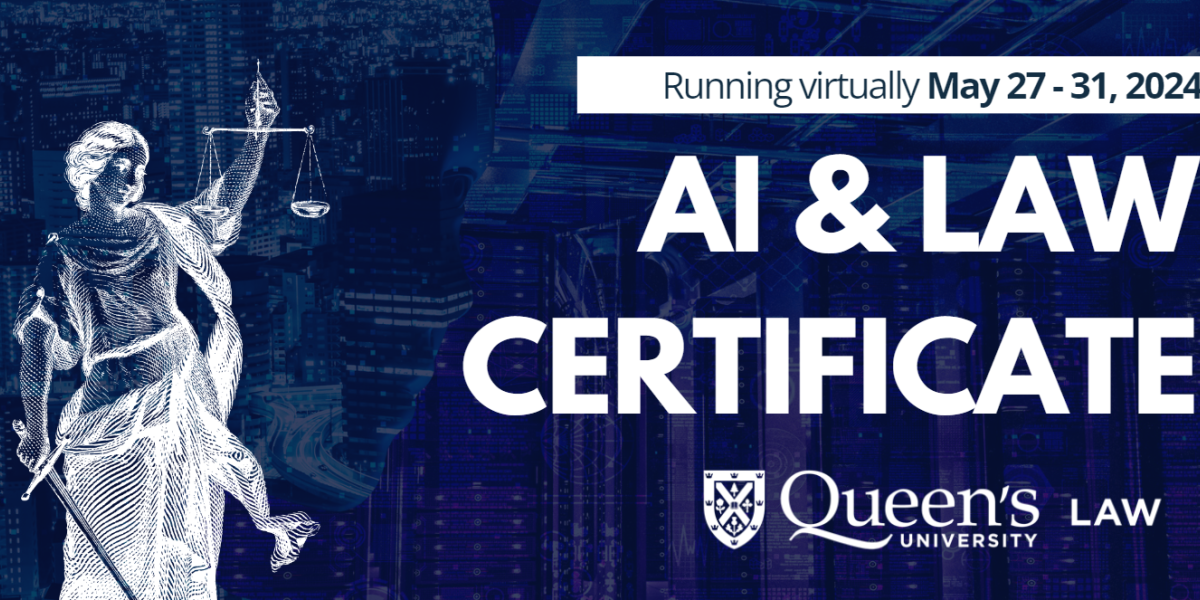Administrative Law & AI @ Queen’s Law

I am happy to have been asked to teach a module in the Queen’s AI and Law Certificate, running virtually later this month. Here is the outline for my session:
AI & Law Certificate
Queen’s Law
AI and Admin Law / Accountability, Friday 31 May 2024, 9am to 12pm
Paul Daly
University of Ottawa
This session is designed to introduce students to the legal implications of the use of AI in public administration. Drawing on concrete contemporary examples, we will apply the principles of administrative law – lawfulness, administrative justice and accountability – to AI in public administration.
Required reading:
Government of Canada, Directive on Automated Decision-Making (2024)
Government of Canada, Algorithmic Impact Assessment – Spouse or Common-Law Partner in Canada Advanced Analytics (November 2023)
Ocran Affidavit, filed in Federal Court File IMM-5571-20
Part I: Administrative Law Principles
Through an interactive series of questions, students will be given a refresher on the basic principles of administrative law to prime them for applied analysis later in the session. The principles to be discussed are lawfulness – these include reasonableness and procedural fairness – administrative justice and accountability.
Reading
Cobbe, “Administrative law and the machines of government: judicial review of automated public-sector decision-making” (2019) 39 Legal Studies 636 (optional)
Daly, “Artificial Administration: Administrative Law, Administrative Justice and Accountability in the Age of Machines” (2023) 30 Australian Journal of Administrative Law 95 (optional)
Daly, Raso and Tomlinson, “Administrative Law in the Digital World” in Harlow ed., A Research Handbook on Administrative Law (Edward Elgar, 2023) (optional)
Zalnieriute, Moses and Williams, “The Rule of Law and Automated Government Decision-Making” (2019) 82 Modern Law Review 425 (optional)
Part II: AI in Public Administration
We will briefly discuss the ways in which technology is currently being used in public administration in Canada. Once each use case is introduced, students will be asked to provide a ‘comfort’ score on a scale of 1 to 10: “how comfortable do you feel with the use of technology in this instance?” We will also discuss the Directive on Automated Decision-making.
Reading
Daly, “Mapping Artificial Intelligence Use in the Government of Canada” (2023) 20 Governance Review 74 (optional)
Government of Canada, Directive on Automated Decision-Making (2024) (required)
Part III: Critical Analysis
In this section we will apply the principles of administrative law to two current uses of technology in Canadian public administration and assess the effectiveness of the Directive on Automated Decision-Making in ensuring accountability for their use. The first case study will be Immigration, Refugees and Citizenship Canada’s advanced analytics for spouse or common-law partner in Canada determinations. The second will be the Chinook tool used by the same entity. Students will be split into small groups to conduct critical analysis of these case studies and then synthesize their insights in a plenary session.
Reading
Cobbe et al, “Reviewable Automated Decision-Making: A Framework for Accountable Algorithmic Systems” (2021) Computers and Society arXiv:2102.04201 (optional)
Daly, “Artificial Administration: Administrative Law, Administrative Justice and Accountability in the Age of Machines” (2023) 30 Australian Journal of Administrative Law 95 (optional)
Government of Canada, Algorithmic Impact Assessment – Spouse or Common-Law Partner in Canada Advanced Analytics (November 2023) (required)
Ocran Affidavit, filed in Federal Court File IMM-5571-20 (required)
Scassa, “Administrative Law and the Governance of Automated Decision-Making: A Critical Look at Canada’s Directive on Automated Decision-Making” (2021) 54 University of British Columbia Law Review 251 (optional)
Williams, “Rethinking Administrative Law for Algorithmic Decision-Making” (2022) 42 Oxford Journal of Legal Studies 468 (optional)
This content has been updated on May 3, 2024 at 14:44.